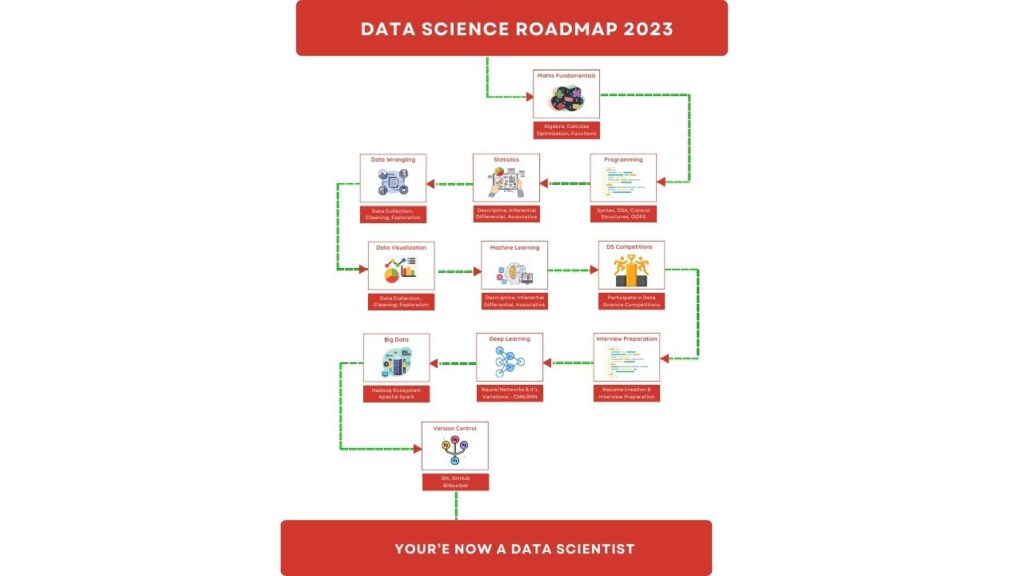In the ever- evolving world of data wisdom, staying ahead of the wind is pivotal. As we step into 2023, the data wisdom geography is ripe with openings and challenges. Whether you are a freshman looking to embark on this instigative trip or a seasoned pro seeking to modernize your chops, this roadmap will guide you through the essential rudiments of data wisdom in 2023. Let’s dive right in!
Table of Contents
1. Maths Fundamentals
Algebra: Building the Foundation
- Algebra: Building the Foundation
- Calculus Optimization: The Art of Maximizing and Minimizing
- Functions: The Backbone of Data Science
2. Programming
- Syntax: Mastering the Language
- Data Structures and Algorithms (DSA): The Tools of Efficiency
- Control Structures: Directing the Flow
- ObjectOriented Programming (OOPs): A Paradigm Shift
3. Statistics
- Descriptive Statistics: Making Sense of Data
- Inferential Statistics: Drawing Inferences with Confidence
- Differential Statistics: Uncovering Patterns
- Associative Statistics: Discovering Relationships
4. Data Wrangling
- Data Collection: Gathering the Raw Material
- Data Cleaning: Polishing Your Dataset
- Data Exploration: Understanding the Story Within
5. Data Visualization
- Data Visualization Basics: Painting a Picture
- Advanced Data Visualization: Beyond the Basics
6. Machine Learning
- Descriptive Machine Learning: Understanding the Algorithms
- Inferential Machine Learning: Making Predictions
- Differential Machine Learning: Finding Anomalies
- Associative Machine Learning: Making Recommendations
7. Data Science Competitions
- Participate in Data Science Competitions: The RealWorld Arena
8. Big Data
- Hadoop Ecosystem: Taming the Big Data Beast
- Apache Spark: Sparking Data Transformation
9. Deep Learning
- Neural Networks and Variations: The Power of Deep Learning
- Convolutional Neural Networks (CNN): For Image Analysis
- Recurrent Neural Networks (RNN): Sequences and Time Series
10. Interview Preparation
- Resume Creation: Your Data Science Story
- Interview Preparation: Navigating the Interview Maze
Important Maths Fundamentals to be consider
Algebra: Building the Foundation
Algebra may seem basic, but it’s the cornerstone of data science. From equations to matrices, understanding algebraic concepts will help you manipulate and analyze data effectively.
Calculus Optimization: The Art of Maximizing and Minimizing
Calculus isn’t just for mathematicians. It’s essential for optimizing machine learning algorithms and understanding gradient descent, a critical optimization technique.
Functions: The Backbone of Data Science
Functions, in the context of data science, are not mere mathematical entities. They represent relationships between variables, a vital concept when dealing with data.
Syntax: Mastering the Language
Whether you choose Python, R, or another language, mastering its syntax is crucial. Clean, efficient code is the bedrock of data science projects.
Data Structures and Algorithms (DSA): The Tools of Efficiency
DSA knowledge helps you process large datasets and build algorithms for machine learning models. Efficiency matters in data science.
Control Structures: Directing the Flow
Conditional statements and loops control the flow of your code. Understanding them is like having a map to navigate your data journey.
ObjectOriented Programming (OOPs): A Paradigm Shift
OOPs concepts allow you to design complex data pipelines and machine learning models. It’s the way forward in data science development.
Descriptive Statistics: Making Sense of Data
Before diving into complex models, you need to understand the basics of descriptive statistics. It’s about summarizing and visualizing data effectively.
Inferential Statistics: Drawing Inferences with Confidence
Inferential statistics help you make predictions based on data samples. It’s the bridge between your dataset and real world insights.
Differential Statistics: Uncovering Patterns
Differential statistics, like time series analysis, helps you spot trends and patterns. It’s crucial for making data driven decisions.
Associative Statistics: Discovering Relationships
Correlation and regression analysis help you uncover relationships between variables, a valuable skill in data science.
Data Collection: Gathering the Raw Material
Collecting data from various sources requires skills in web scraping, API integration, or database querying.
Data Cleaning: Polishing Your Dataset
Before analysis, you must clean and preprocess your data. Handling missing values and outliers is part of the data scientist’s routine.
Data Exploration: Understanding the Story Within
Exploratory data analysis reveals insights and anomalies, setting the stage for further analysis and modeling.
Data Visualization Basics: Painting a Picture
Visualizing data is like creating art. Learn to use libraries like Matplotlib and Seaborn to tell compelling data stories.
Advanced Data Visualization: Beyond the Basics
Take your visualization skills to the next level with interactive dashboards and storytelling techniques.
Descriptive Machine Learning: Understanding the Algorithms
From linear regression to decision trees, understand the foundational algorithms that power machine learning.
Inferential Machine Learning: Making Predictions
Predictive modeling is the heart of machine learning. Dive deep into algorithms like Random Forest and XGBoost.
Differential Machine Learning: Finding Anomalies
Identify outliers and anomalies in your data with techniques like anomaly detection.
Associative Machine Learning: Making Recommendations
Recommender systems and collaborative filtering are the building blocks of personalized recommendations.
Participate in Data Science Competitions: The RealWorld Arena
Kaggle and other platforms offer real world datasets and challenging problems. Participating in competitions hones your skills and builds your portfolio.
Hadoop Ecosystem: Taming the Big Data Beast
Learn how to process and analyze massive datasets using Hadoop and related technologies.
Apache Spark: Sparking Data Transformation
Apache Spark enables lightning fast data processing. Mastering it is essential for handling big data efficiently.
Neural Networks and Variations: The Power of Deep Learning
Deep learning is at the forefront of AI. Explore neural network architectures and their applications.
Convolutional Neural Networks (CaNN): For Image Analysis
CNNs are the goto choice for imagerelated tasks, from image recognition to object detection.
Recurrent Neural Networks (RNN): Sequences and Time Series
RNNs are ideal for sequential data, making them indispensable in natural language processing and time series forecasting.
Resume Creation: Your Data Science Story
Craft a compelling resume that highlights your skills and experience, showcasing yourself as a valuable data science candidate.
Interview Preparation: Navigating the Interview Maze
From technical questions to behavioral interviews, get ready to impress potential employers and ace your data science interviews.
Conclusion
As you embark on your data science journey in 2023, remember that it’s not just about following this roadmap religiously. Adapt it to your unique interests and goals. Stay curious, practice regularly, and never stop learning. The world of data science is ever evolving, and you have the tools to thrive in it.







